Editorial responsibilities : Direction de la collection "Droit et Économie", L.G.D.J. - Lextenso éditions (30)
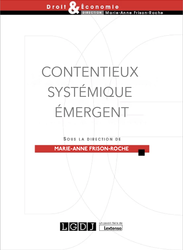
🌐follow Marie-Anne Frison-Roche on LinkedIn
🌐subscribe to the Newsletter MAFR. Regulation, Compliance, Law
____
► Full Reference: M.-A. Frison-Roche (ed.), Contentieux Systémique Émergent (Emerging Systemic Litigation), Paris, LGDJ, "Droit & Économie" Serie, to be published
____
📚Consult all the other books of the Serie in which this book is published
____
► General Presentation of the Book :
____
TABLE OF CONTENTS
Thesaurus : Doctrine

► Référence complète : P.-Y. Gautier, « Contre le droit illimité à la preuve devant les autorités administratives indépendantes », Mélanges en l'honneur du Professeur Claude Lucas de Leyssac, LexisNexis, 2018, p.181-193.
____
📘 Lire une présentation générale de l'ouvrage dans lequel l'article est publié

Publications
🌐suivre Marie-Anne Frison-Roche sur LinkedIn
🌐s'abonner à la Newsletter MAFR Regulation, Compliance, Law
____
 ► Référence complète : M.-A. Frison-Roche, Choix et embranchements de compétences lorsqu'un enjeu de vigilance est allégué, document de travail, novembre 2024.
► Référence complète : M.-A. Frison-Roche, Choix et embranchements de compétences lorsqu'un enjeu de vigilance est allégué, document de travail, novembre 2024.
____
🧮Ce document de travail a été élaboré pour constituer la base d'une intervention à la conférence Le droit processuel de la vigilance, du 18 novembre 2024
qui fait partie du cycle de conférences sur Le contentieux systémique,
____
📕Ce document de travail sera aussi la base d'une contribution pour l'ouvrage publié en 2025.
____
► Résumé du document de travail :
____
🔓lire le document de travail ci-dessous⤵️
Sept. 4, 2025
Publications

🌐follow Marie-Anne Frison-Roche on LinkedIn
🌐subscribe to the Newsletter MAFR Regulation, Compliance, Law
🌐subscribe to the Video Newsletter MAFR Surplomb
____
► Full Reference: M.-A. Frison-Roche, "Le droit processuel, prototype de l'Obligation de Compliance " ("General Procedural Law, prototype of Compliance Obligation"), in M.-A. Frison-Roche (ed.), L'Obligation de Compliance, Journal of Regulation & Compliance (JoRC) and Dalloz, coll. "Régulations & Compliance" 2025, to be published.
____
📝read the article (in French)
____
🚧read the bilingual Working Paper on the basis this contribution has been built, with more developments, technical references and hyperlinks.
____
📕read a general presentation of the book, L'Obligation de Compliance, in which this article is published
____
► English summary of this contribution : At first glance, General Procedural Law seems to be the area least concerned by the Compliance Obligation, because if the person is obliged by it, mainly large companies, it is precisely, thanks to this Ex Ante, in order to never to have to deal with proceedings, these path that leads to the Judge, that Ex Post figure that in return for the weight of the compliance obligation they have been promised they will never see: any prospect of proceedings would be seeming to signify the very failure of the Compliance Obligation (I).
But not only are the legal rules attached to the Procedure necessary because the Judge is involved, and increasingly so, in compliance mechanisms, but they are also rules of General Procedural Law and not a juxtaposition of civil procedure, criminal procedure, administrative procedure, etc., because the Compliance Obligation itself is not confined either to civil procedure or to criminal procedure, to administrative procedure, etc., which in practice gives primacy to what brings them all together: General Procedural Law (II).
In addition to what might be called the "negative" presence of General Procedural Law, there is also a positive reason, because General Procedural Law is the prototype for "Systemic Compliance Litigation", and in particular for the most advanced aspect of this, namely the duty of vigilance (III). In particular, it governs the actions that can be brought before the Courts (IV), and the principles around which proceedings are conducted, with an increased opposition between the adversarial principle, which marries the Compliance Obligation, since both reflect the principle of Information, and the rights of the defence, which do not necessarily serve them, a clash that will pose a procedural difficulty in principle (V).
Finally, and this "prototype" status is even more justified, because Compliance Law has given companies jurisdiction over the way in which they implement their legal Compliance Obligations, it is by respecting and relying on the principles of General Procedural Law that this must be done, in particular through not only sanctions but also internal investigations (VI).
Mais non seulement les règles juridiques attachées à la procédure s'imposent parce que le Juge s'avère présent, et de plus en plus, dans les mécanismes de compliance mais encore ce sont des règles de Droit processuel et non pas une juxtaposition de procédure civile, procédure pénale, procédure administrative, etc., parce que l'obligation de compliance elle-même n'est pas enfermée ni dans le droit civil, ni dans le droit pénal ,dans le contentieux administratif, etc., ce qui donne en pratique primauté à ce qui les réunit toutes : le Droit processuel (II).
A cette raison que l'on pourrait dire "négative" de la présence du Droit processuel s'ajoute une raison positive, parce que le Droit processuel s'avère être le prototype du "Contentieux systémique de la Compliance, et notamment de la pointe avancée de celui-ci qu'est l'obligation de vigilance (III). Il gouverne notamment les actions par lesquelles les Juges peuvent être saisis (IV), les principes autour desquels les procédures se déroulent, avec une opposition accrue entre le principe du contradictoire qui épouse l'obligation de compliance puisque l'un et l'autre traduisent le principe d'information et les droits de la défense qui ne les servent pas nécessairement, heurt qui va poser une difficulté processuelle de principe (V).
Enfin, et la qualité de "prototype" se justifie alors plus encore, parce que le Droit de la compliance a juridictionnalisé les entreprises dans la façon dont celles-ci mettent en oeuvre leurs Obligation légale de Compliance, c'est en respectant et en s'appuyant sur les principes de droit processuel que cela doit être fait, notamment à travers non seulement les sanctions mais encore les enquêtes internes (VI).
________
Sept. 4, 2025
Thesaurus : Doctrine

► Référence complète : Th. Goujon-Bethan, "Les enjeux présents à venir de l’articulation des principes de procédure civile et commerciale avec la logique de compliance", in M.-A. Frison-Roche (dir.), L'Obligation de Compliance, Journal of Regulation & Compliance (JoRC) et Dalloz, coll. "Régulations & Compliance", 2025, à paraître
____
📕lire une présentation générale de l'ouvrage, L'Obligation de Compliance, dans lequel cet article est publié
____
► Résumé de l'article (fait par le Journal of Regulation & Compliance - JoRC) : L'auteur montre que le Code de procédure civile, parce qu'il est exceptionnellement bien conçu et dirigé, peut répondre à l'ampleur de la transformation que le Droit de la Compliance apporte.
Le Droit de la Compliance est normativement ancré dans ses Buts Monumentaux : ceux-ci sont portés en tant que tels devant le juge dans des "causes systémiques".
Or, le Code de procédure civile distingue, et les travaux des auteurs du Code comme ceux de la doctrine le montrent, qu'il faut distinguer le litige et le conflit. En effet, dans une "cause systémique" telle que le Droit de la Compliance les emporte nécessairement (climat, protection des internautes, égalité effective des êtres humains, durabilité des systèmes bancaires, etc.) ce sont des parties qui sont en litiges, tandis que le conflit embrasse lui les systèmes eux-mêmes et d'autres entités.
La procédure doit intégrer non seulement le litige mais encore le conflit. Cela implique notamment que l'on s'occupe non seulement du litige, mais encore du conflit, lequel ne s'éteint pas nécessairement avec le litige, et ne trouve pas les mêmes solutions que celles demandées par le litige. C'est notamment dans cette dernière perspective, essentiellement dans une procédure de "Cause Systémique de Compliance" que les techniques de médiation, d'amicus curiae, d'un juge qui se situe ex ante, etc., s'imposent. Elles sont disponibles à travers des articles du Code de procédure civile : il suffit que les juges, comprenant ce que sont les "Causes Systémiques de Compliance" s'en saisissent.
________
March 19, 2025
Interviews

🌐suivre Marie-Anne Frison-Roche sur LinkedIn
🌐s'abonner à la Newsletter MAFR Regulation, Compliance, Law
🌐s'abonner à la Newsletter en vidéo MAFR Surplomb
____
► Référence complète : M.-A. Frison-Roche, «Les juristes ont le pouvoir et le devoir de dire Non à Trump » », interview réalisée par Olivia Dufour pour Actu-juridique, Lextenso, 19 février 2025
___
► lire l'entretien : 💬 Lire l'interview
🌐lire la présentation de l'entretien sur LinkedIn
____
► présentation de l'entretien par Actu-Juridique : La tension monte entre Donald Trump et la justice américaine. Alors que le président a demandé la destitution d’un juge qui avait prononcé la suspension d’une expulsion de migrants, le président de la Cour Suprême a rappelé mardi dans un communiqué qu’il existait une procédure d’appel quand on n’était pas satisfait d’une décision de justice. Donald Trump s’en prend aussi aux avocats. Face à cet exécutif apparemment tout-puissant, les juristes ont-ils suffisamment de pouvoir pour faire respecter l’État de droit ? Oui, estime le professeur Marie-Anne Frison-Roche.
____
Q. Depuis son entrée en fonctions, Donald Trump se positionne au-dessus du droit dans un pays qui pourtant accorde à celui-ci un pouvoir déterminant. Les juristes sont-ils en capacité de résister ?
Résumé de la réponse de MAFR : El
Q. De quels outils disposent-ils ?
Résumé de la réponse MAFR : l'
Q. Les juges peuvent bien invalider les décisions de l'exécutif, c'est celui-ci qui finalement les exécute. Ou pas. N'est-ce pas une limite insurmontable au contrepouvoir des juges ?
Résumé de la réponse MAFR : Le
.
_________

Updated: Feb. 11, 2025 (Initial publication: May 20, 2023)
Publications

.🌐follow Marie-Anne Frison-Roche on LinkedIn
🌐subscribe to the Newsletter MAFR Regulation, Compliance, Law
____
 ► Full Reference: M.-A. Frison-Roche, General Procedural Law, prototype of Compliance Obligation, Working Paper, June 2023 (updated in February 2025).
► Full Reference: M.-A. Frison-Roche, General Procedural Law, prototype of Compliance Obligation, Working Paper, June 2023 (updated in February 2025).
____
🎤 This working paper was drawn up as a basis for the presentation "Droit de la Compliance et Droit processuel" ("Compliance Law and General Procedural Law") at the colloquium on 13 June 2023, , and then completed for publication.
____
📝It is therefore also the basis for the written contribution, "The General Procedural Obligation, prototype of the Compliance Obligation", in the book to be published Compliance Obligation
____
► Working Paper summary: At first glance, General Procedural Law seems to be the area least concerned by the Compliance Obligation, because if the person is obliged by it, mainly large companies, it is precisely, thanks to this Ex Ante, in order to never to have to deal with proceedings, these path that leads to the Judge, that Ex Post figure that in return for the weight of the compliance obligation they have been promised they will never see: any prospect of proceedings would be seeming to signify the very failure of the Compliance Obligation (I).
But not only are the legal rules attached to the Procedure necessary because the Judge is involved, and increasingly so, in compliance mechanisms, but they are also rules of General Procedural Law and not a juxtaposition of civil procedure, criminal procedure, administrative procedure, etc., because the Compliance Obligation itself is not confined either to civil procedure or to criminal procedure, to administrative procedure, etc., which in practice gives primacy to what brings them all together: General Procedural Law (II).
In addition to what might be called the "negative" presence of General Procedural Law, there is also a positive reason, because General Procedural Law is the prototype for "Systemic Compliance Litigation", and in particular for the most advanced aspect of this, namely the duty of vigilance (III). In particular, it governs the actions that can be brought before the Courts (IV), and the principles around which proceedings are conducted, with an increased opposition between the adversarial principle, which marries the Compliance Obligation, since both reflect the principle of Information, and the rights of the defence, which do not necessarily serve them, a clash that will pose a procedural difficulty in principle (V).
Finally, and this "prototype" status is even more justified, because Compliance Law has given companies jurisdiction over the way in which they implement their legal Compliance Obligations, it is by respecting and relying on the principles of General Procedural Law that this must be done, in particular through not only sanctions but also internal investigations (VI).
____
🔓read the developments below⤵️
Jan. 1, 2025
Publications

🌐 suivre Marie-Anne Frison-Roche sur LinkedIn
🌐 s'abonner à la Newsletter MAFR Regulation, Compliance, Law
____
► Référence complète : M.-A. Frison-Roche, "L’Obligation de Compliance : nouvelle Obligation, manifestation d'une nouvelle branche du Droit", in M.A. Frison-Roche (dir.), L'Obligation de Compliance, Journal of Regulation & Compliance (JoRC) et Dalloz, coll. "Régulations & Compliance", à paraître.
____
► Cet article constitue la conclusion de l'ouvrage ; il est en accès libre.
____
📕consulter une présentation générale de l'ouvrage, L'Obligation de Compliance, dans lequel cet article est publié
____
► Résumé de l'article : Cet article est construit en deux parties.
La première partie explique la façon dont cette "Obligation de Compliance", qui est nouvelle, est elle-même la manifestation de cette branche du Droit nouvelle qu'est le Droit de la Compliance.
En appui de cela, l'article reprend dans sa seconde partie, en reprenant la structuration même de l'ouvrage que j'avais conçue chacune des contributions et la résumant et en la resituant dans la démonstration d'ensemble.
Cet article est en accès libre⤵️
Nov. 18, 2024
Conferences

🌐follow Marie-Anne Frison-Roche on LinkedIn
🌐subscribe to the Newsletter MAFR Regulation, Compliance, Law
🌐subscribe to the Newsletter Surplomb, par MAFR
____
► Full Reference: M.-A. Frison-Roche, "Choix et embranchements de compétences lorsqu'un enjeu de vigilance est allégué" ("Choice and Branching of Jurisdiction when a Vigilance issue is Alleged"), in Le Droit processuel de la Vigilance (Vigilance General Procedural Law), in cycle of conference-debates "Contentieux Systémique Émergent" ("Emerging Systemic Litigation"), organised on the initiative of the Cour d'appel de Paris (Paris Cour of Appeal), with the Cour de cassation (French Court of cassation), the Cour d'appel de Versailles (Versailles Court of Appeal), the École nationale de la magistrature - ENM (French National School for the Judiciary) and the École de formation des barreaux du ressort de la Cour d'appel de Paris - EFB (Paris Bar School), under the scientific direction of Marie-Anne Frison-Roche, November 18, 2024, 11h-12h30, Cour d'appel de Paris, Cassin courtroom
____
🕴️An other speaker to this conference is Natalie Fricero, Emeritus Professor at Côte d'Azur University
🧮see the full programme of this event
____
⚙️This event was conceived as part of the "Emerging Systemic Litigation" cycle of conference-debates, organized by the Paris Court of appeal, in conjunction with the French Court of cassation, the Versailles Court of appeal, the French National School for the Judiciary and the Paris Bar School, under the scientific direction of Marie-Anne Frison-Roche.
____
► English Summary of the conference: This speech opens the conference. It therefore logically focuses on the question of "jurisdictional competence". It is divided into successive points which are progressively linked to each other.
The first point consists to insist on this rule : the organisation of the courts and their jurisdiction can never be detached from the substance of the matter in dispute. This explains why the issue of jurisdiction is such a source of passion for as long as the very definition of Vigilance remains so contentious, and why the 2021 legislature's belief that it could put out the fire has only served to exacerbate it.
The second point relates to the first proposed solution, i.e. maintaining the exclusivity of the Paris First Judicial Court, which is acceptable in principle because by specialising judges acquire a "technical competence" but which presents a very damaging "Bibendum risk".
The third point relates to the second solution proposed, namely the reference to the Motulskian notion of the 'basis of demand', which provokes a fork in the road, with the risk of interminable conflicts and divergent interpretations.
The fourth point is the need to find the best solution, i.e. the least bad solution, consisting above all of forming practical alliances, without requiring new texts, for this particular type of litigation which does not come under any branch of Law and which justifies a dialogue between the heads of the courts.
____
🔓read the key points of this speech below ⤵️
________

Nov. 18, 2024
Organization of scientific events
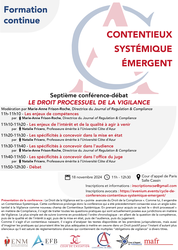
► Full Reference: Le Droit processuel de la Vigilance (Vigilance General Procedural Law), in cycle of conference-debates "Contentieux Systémique Émergent" ("Emerging Systemic Litigation"), organised on the initiative of the Cour d'appel de Paris (Paris Cour of Appeal), with the Cour de cassation (French Court of cassation), the Cour d'appel de Versailles (Versailles Court of Appeal), the École nationale de la magistrature - ENM (French National School for the Judiciary) and the École de formation des barreaux du ressort de la Cour d'appel de Paris - EFB (Paris Bar School), under the scientific direction of Marie-Anne Frison-Roche, November 18, 2024, 11h-12h30, Cour d'appel de Paris, Cassin courtroom
____
► Presentation of the conférence:
____
🧮Programme of this event:
Seventh conference-debate
LE DROIT PROCESSUEL DE LA VIGILANCE
(VIGILANCE GENERAL PROCEDURAL LAW)
Paris Court of Appeal, Cassin courtroom
Presentation and moderation par Marie-Anne Frison-Roche, Professor of Regulatory and Compliance Law, Director ot the Journal of Regulation & Compliance (JoRC)
🕰️11h-11h20. 🎤, by 🕴️Marie-Anne Frison-Roche, Professor of Regulatory and Compliance Law, Director ot the Journal of Regulation & Compliance (JoRC)
🕰️11h20-11h40. 🎤, by 🕴️Natalie Fricero, Emeritus Professor of Law at Côte d'Azur University
🕰️11h40-12h30. Debate
____
🔴Registrations and information requests can be sent to: inscriptionscse@gmail.com
🔴For the attorneys, registrations have to be sent to the following address: https://evenium.events/cycle-de-conferences-contentieux-systemique-emergent/
⚠️The conference-debates are held in person only, in the Cour d’appel de Paris (Paris Court of Appeal).
________

Oct. 29, 2024
MAFR TV : MAFR TV - Overhang

🌐suivre Marie-Anne Frison-Roche sur LinkedIn
🌐s'abonner à la Newsletter MAFR. Regulation, Compliance, Law
🌐s'abonner à la Newsletter Surplomb, par MAFR
____
► Référence complète : M.-A. Frison-Roche, "Droit processuel de la Régulation et de la Compliance", in série de vidéos Surplomb, 29 octobre 2024
____
🌐visionner sur LinkedIn cette vidéo de la série Surplomb
____
____
🎬visionner ci-dessous cette vidéo de la série Surplomb⤵️
____
Surplomp, par mafr
la série de vidéos dédiée à la Régulation, la Compliance et la Vigilance
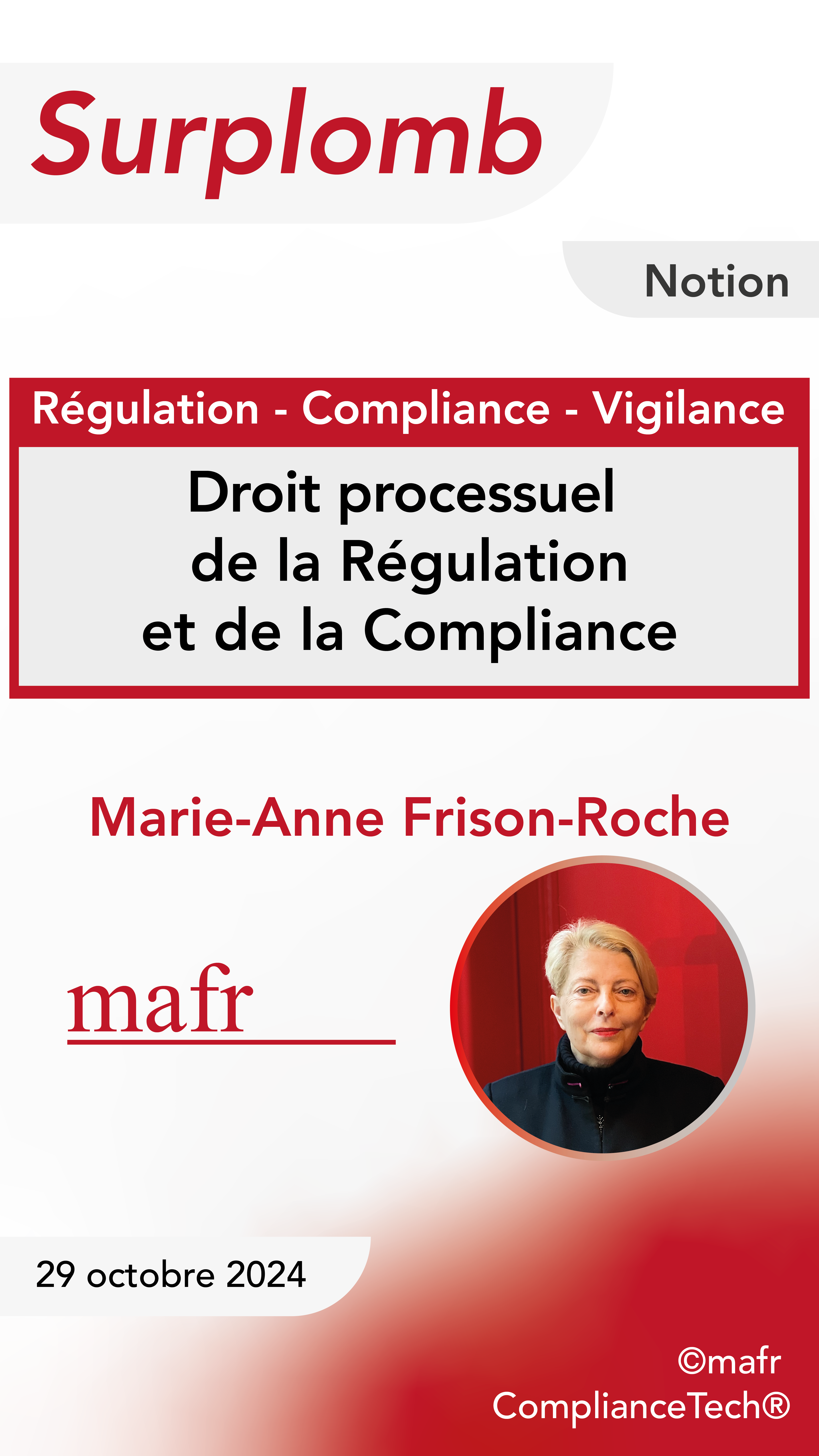


Oct. 3, 2024
MAFR TV : MAFR TV - Overhang

🌐suivre Marie-Anne Frison-Roche sur LinkedIn
🌐s'abonner à la Newsletter MAFR. Regulation, Compliance, Law
🌐s'abonner à la Newsletter Surplomb, par MAFR
____
► Référence complète : M.-A. Frison-Roche, "Le Contentieux Systémique, notion nouvelle au-delà des branches traditionnelles du Droit", in série de vidéos Surplomb, 3 octobre 2024
____
🌐visionner sur LinkedIn cette vidéo de la série Surplomb
____
____
🎬visionner ci-dessous cette vidéo de la série Surplomb⤵️
____
Surplomp, par mafr
la série de vidéos dédiée à la Régulation, la Compliance et la Vigilance
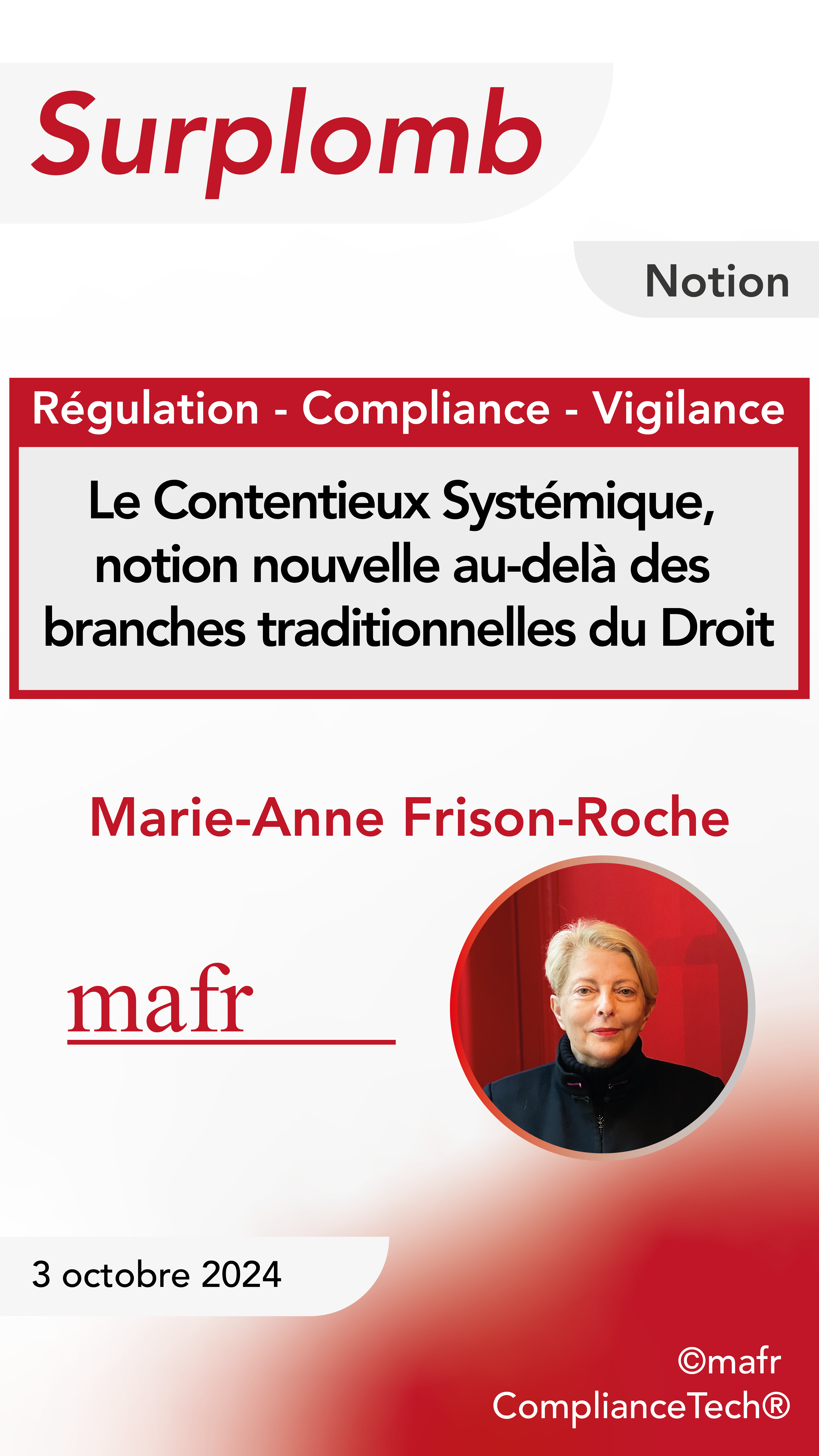

Sept. 25, 2024
Conferences
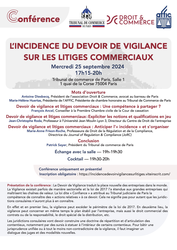
🌐follow Marie-Anne Frison-Roche on LinkedIn
🌐subscribe to the Newsletter MAFR Regulation, Compliance, Law
🌐subscribe to the Video Newsletter MAFR Surplomb
____
► Full Reference: M.-A. Frison-Roche, "Devoir de vigilance et litiges commerciaux : Anticiper l'"incidence" et s’organiser" ("Duty of vigilance and Commercial Litigation: Anticipating the "impact" and getting organised"), in L'incidence du devoir de vigilance sur les litiges commerciaux (The Impact of the Duty of Vigilance on Commercial Litigation), Tribunal de commerce de Paris (Paris Commercial Court), Droit & Commerce and Association Française en Faveur de l'Institution Consulaire (AFFIC), Tribunal de commerce de Paris, September 25, 2024, 17.15pm to 20pm
____
🌐read the report of this speech on LinkedIn (in French)
____
🧮see the full programme of this event (in French)
____
🧱consult the scientific coordination sheet of this event
____
🌐consult on LinkedIn a general presentation of this event (in French)
____
► English Summary of the conference: After listening to the enlightening speeches of François Ancel and Jean-Christophe Roda, I had the great opportunity to emphasise, as they did, that the duty of vigilance, in the respect of French laws of 2017 and 2021, with a view to the transposition of the CS3D, does not imply, so brutally as has been said, a lack of knowledge by judges other than those of the Tribunal judiciaire de Paris (Paris First Instance Civil Court) of this new Law, which is the extension of Compliance Law, as François Ancel reminded us.
Because Commercial Court judges deal with Contract Law on a daily basis, and because companies build their value chains through contracts that should be described as "regulatory contracts", the duty of vigilance has an "impact" on these disputes.
These disputes may be of a "systemic" nature.
This can only result not in jurisdictional trenches, but in "shared jurisdiction", along the lines drawn by François Ancel. This sharing must be built through a dialogue between judges, a necessary method on which Patrick Sayer concluded this elaborate conference on an essential and forward-looking subject.
________

Sept. 25, 2024
Organization of scientific events

🌐follow Marie-Anne Frison-Roche on LinkedIn
🌐subscribe to the Newsletter MAFR Regulation, Compliance, Law
____
► Full Reference: M.-A. Frison-Roche, coordination of the conference L'incidence du devoir de vigilance sur les litiges commerciaux (The impact of the duty of vigilance on commercial litigation), Tribunal de commerce de Paris (Paris Commercial Court), Droit & Commerce and Association Française en Faveur de l'Institution Consulaire (AFFIC), Tribunal de commerce de Paris, 25 September 2024, 5.15p.m. to 8p.m.
____
🧮see the full programme of this event
____
🌐consult on LinkedIn a general présentation of this event (in French)
____
► General presentation of the conference: The Duty of Vigilance reflects the new role of firms in the world. Vigilance sometimes existed on a sectoral basis, but the 2017 French law extended it to large companies that control value chains. The French so-called "confiance" law gave the Tribunal judiciaire de Paris (Paris First Instance Civil Court) jurisdiction to hear "actions relatives" ("actions relating") to this duty. This does not mean, however, that the commercial courts will no longer have jurisdiction.
Firstly, vigilance may go beyond the scope of the 2017 French law. Secondly, vigilance may concern not only the plan drawn up by the firm, but also Commercial Contract Law or Liability Law, special Distribution Law, etc.
Commercial courts will have to develop a doctrine for dividing up and coordinating disputes, in particular by staying proceedings within certain disputes. To build a unified or at least non-contradictory case law on vigilance, we need to imagine a dialogue between judges and new procedures.
____
🧮Programme of this event:
L'INCIDENCE DU DEVOIR DE VIGILANCE SUR LES LITIGES COMMERCIAUX
(THE IMPACT OF THE DUTY OF VIGILANCE ON COMMERCIAL LITIGATION)
Paris First Instance Commercial Court, room 1
🕰️5.15pm.-5.30pm. Welcome
🕰️5.30pm.-5.40pm. 🎤Mots d'ouverture (Opening words), by 🕴️Antoine Diesbecq, President of Droit & Commerce, attorney at the Paris Bar and 🕴️Marie-Hélène Huertas, President of AFFIC, Honorary President of Chamber of the Paris First Instance Commercial Court
🕰️5.40pm.-6pm. 🎤Devoir de vigilance et litiges commerciaux : Une compétence à partager ? (Duty of Vigilance and Commercial Litigation: A jurisdiction to share?), by 🕴️François Ancel, Judge at the Première Chambre civile de la Cour de cassation (First Civil Chamber of the French Court of cassation)
🕰️6pm.-6.20pm. 🎤Devoir de vigilance et litiges commerciaux : Expliciter les notions et qualifications en jeu (Duty of Vigilance and Commercial Litigation: Explain the concepts and qualifications involved?), by 🕴️Jean-Christophe Roda, Full Professor at Jean Moulin Lyon 3 University, Director of the Centre de Droit de l’entreprise
🕰️6.20pm.-6.40pm. 🎤Devoir de vigilance et litiges commerciaux : Anticiper l''incidence" et s’organiser (Duty of Vigilance and Commercial Litigation: Anticipating the "impact" and getting organised), by 🕴️Marie-Anne Frison-Roche, Professor of Regulatory Law and Compliance Law, Director of the Journal of Regulation & Compliance (JoRC)
🕰️6.40pm.-7pm. 🎤Conclusion (Conclusion), by 🕴️Patrick Sayer, President of the Tribunal de commerce de Paris (Paris First Instance Commercial Court)
🕰️7pm.-7.30pm. Discussion with the audience
🕰️7.30pm.-8pm. Cocktail
________
May 29, 2024
Editorial responsibilities : Direction of the collection Compliance & Regulation, JoRC and Bruylant

🌐follow Marie-Anne Frison-Roche on LinkedIn
🌐subscribe to the Newsletter MAFR Regulation, Compliance, Law
____
► Full Reference: M.-A. Frison-Roche (ed.), Compliance Obligation, Journal of Regulation & Compliance (JoRC) and Bruylant, "Compliance & Regulation" Serie, to be published
____
📕In parallel, a book in French L'Obligation de compliance, is published in the collection "Régulations & Compliance" co-published by the Journal of Regulation & Compliance (JoRC) and Dalloz.
____
📚This book is inserted in this series created by Marie-Anne Frison-Roche for developing Compliance Law.
read the presentations of the other books of this Compliance Series:
- further books:
🕴️M.A. Frison-Roche (dir.), 📘Le système probatoire de la compliance, 2025
- previous books:
🕴️M.A. Frison-Roche (ed), 📘Compliance Juridictionnalisation, 2023
🕴️M.A. Frison-Roche (ed), 📘Compliance Monumental Goals, 2022
🕴️M.-A. Frison-Roche (ed.), 📘Compliance Tools, 2021
____
► go to the general presentation of this 📚Series Compliance & Regulation, conceived, founded et managed by Marie-Anne Frison-Roche, co-published par the Journal of Regulation & Compliance (JoRC) and Bruylant.
____
🧮the book follows the cycle of colloquia 2023 organised by the Journal of Regulation & Compliance (JoRC) and its Universities partners.
____
► general presentation of the book: Compliance is sometimes presented as something that cannot be avoided, which is tantamount to seeing it as the legal obligation par excellence, Criminal Law being its most appropriate mode of expression. However, this is not so evident. Moreover, it is becoming difficult to find a unity to the set of compliance tools, encompassing what refers to a moral representation of the world, or even to the cultures specific to each company, Compliance Law only having to produce incentives or translate this ethical movement. The obligation of compliance is therefore difficult to define.
This difficulty to define affecting the obligation of compliance reflects the uncertainty that still affects Compliance Law in which this obligation develops. Indeed, if we were to limit this branch of law to the obligation to "be conform" with the applicable regulations, the obligation would then be located more in these "regulations", the classical branches of Law which are Contract Law and Tort Law organising "Obligations" paradoxically remaining distant from it. In practice, however, it is on the one hand Liability actions that give life to legal requirements, while companies make themselves responsible through commitments, often unilateral, while contracts multiply, the articulation between legal requirements and corporate and contractual organisations ultimately creating a new way of "governing" not only companies but also what is external to them, so that the Monumental Goals, that Compliance Law substantially aims at, are achieved.
The various Compliance Tools illustrate this spectrum of the Compliance Obligation which varies in its intensity and takes many forms, either as an extension of the classic legal instruments, as in the field of information, or in a more novel way through specific instruments, such as whistleblowing or vigilance. The contract, in that it is by nature an Ex-Ante instrument and not very constrained by borders, can then appear as a natural instrument in the compliance system, as is the Judge who is the guarantor of the proper execution of Contract and Tort laws. The relationship between companies, stakeholders and political authorities is thus renewed.
____
🏗️general construction of the book
The book opens with a double Introduction. The first, which is freely accessible, is a summary of the book, while the second, which is substantial, deals with the future development of the compliance obligation in a borderless economic system.
The first part is devoted to the definition of the Compliance Obligation.
The second part presents commitments and contracts, in certain new or classic categories, in particular public contracts, and compliance stipulations, analysed and qualified regarding Compliance Law and the various relevant branches of Law.
The third part develops the responsibilities attached to the compliance obligation.
The fourth part refers to the institutions that are responsible for the effectiveness, efficiency, and efficacy of the compliance obligation, including the judge and the international arbitrator.
The fifth part takes the Obligation or Duty of Vigilance as an illustration of all these considerations.
____
TABLE OF CONTENTS
COMPLIANCE OBLIGATION : OVERVIEW
Section 1 ♦️ Main Aspects of the Book L'Obligation de Compliance, by 🕴️Marie-Anne Frison-Roche
Section 2 ♦️ Conceiving the unicity of the Compliance Obligation without diluting it, by 🕴️Marie-Anne Frison-Roche
TITLE I.
IDENTIFYING THE COMPLIANCE OBLIGATION
CHAPTER I: NATURE OF THE COMPLIANCE OBLIGATION
Section 1 ♦️ Will, Heart and Calculation, the three marks surrounding the Compliance Obligation, by 🕴️Marie-Anne Frison-Roche
Section 2 ♦️ Debt, as the basis of the compliance obligation, by 🕴️Bruno Deffains
Section 3 ♦️ Compliance Obligation and Human Rights, by 🕴️Jean-Baptiste Racine
Section 4 ♦️ Compliance Obligation and changes in Sovereignty and Citizenship, by 🕴️René Sève
CHAPTER II: SPACES OF THE COMPLIANCE OBLIGATION
Section 1 ♦️ Industrial Entities and Compliance Obligation, by 🕴️Etienne Maclouf
Section 2 ♦️ Compliance, Value Chains and Service Economy, by 🕴️Lucien Rapp
Section 3 ♦️ Compliance and conflict of laws. International Law of Vigilance-Conformity, based on recent applications in Europe, by 🕴️Louis d'Avout
TITLE II.
ARTICULATING THE COMPLIANCE OBLIGATION WITH BRANCHES OF LAW
Section 1 ♦️ Constitutional dimensions of the Compliance Obligation, by 🕴️Stéphane Mouton
Section 2 ♦️ Tax Law and Compliance Obligation, by 🕴️Daniel Gutmann
Section 3 ♦️ General Procedural Law, prototype of the Compliance Obligation, by 🕴️Marie-Anne Frison-Roche
Section 4 ♦️ Corporate and Financial Markets Law facing the Compliance Obligation, by 🕴️Anne-Valérie Le Fur
Section 5 ♦️ The Relation between Tort Law and Compliance Obligation, by 🕴️Jean-Sébastien Borghetti
Section 6 ♦️ Environmental and Climate Compliance, by 🕴️Marta Torre-Schaub
Section 7 ♦️ Competition Law and Compliance Law, by 🕴️Jean-Christophe Roda
Section 8 ♦️ The Compliance Obligation in Global Law, by 🕴️Benoît Frydman
Section 9 ♦️ Transformation of Labour Relations and Vigilance Obligation, by 🕴️Stéphane Vernac
Section 11 ♦️ Judge of Insolvency Law and Compliance Obligations, by 🕴️Jean-Baptiste Barbièri
TITLE III.
COMPLIANCE : GIVE AND TAKE THE MEANS TO OBLIGE
CHAPTER I: CONVERGENCE OF SOURCES
Section 1 ♦️ Compliance Obligation, between Will and Consent: obligation upon obligation works, by 🕴️Marie-Anne Frison-Roche
Section 2 ♦️ What a Commitment is, by 🕴️Marie-Anne Frison-Roche
Section 3 ♦️ Cybersecurity and Compliance Obligation, by 🕴️Michel Séjean
Section 4 ♦️ Place of Hope in the Ability to Apprehend the Future, by 🕴️
Section 5 ♦️ Legal Constraint and Company Strategies in Compliance matters, by 🕴️Jean-Philippe Denis & Nathalie Fabbe-Costes
CHAPTER II: INTERNATIONAL ARBITRATION IN SUPPORT OF THE COMPLIANCE OBLIGATION
Section 1 ♦️ Reinforcing Compliance Commitments by referring Ex Ante to International Arbitration, by
Section 2 ♦️ The Arbitral Tribunal's Award in Kind, in support of the Compliance Obligation, by 🕴️Eduardo Silva Romero
Section 3 ♦️ The use of International Arbitration to reinforce the Compliance Obligation: the example of the construction sector, by 🕴️Christophe Lapp & 🕴️Jean-François Guillemin
Section 4 ♦️ The Arbitrator, Judge, Supervisor, Support, by 🕴️Jean-Baptiste Racine
Section 5 ♦️ How International Arbitration can reinforce the Compliance Obligation, by 🕴️Laurent Aynès
TITLE IV.
VIGILANCE, SPEARHEAD OF THE COMPLIANCE OBLIGATION
CHAPTER I: INTENSITIES OF THE VIGILANCE OBLIGATION, SPEARHEAD OF THE COMPLIANCE SYSTEM
Section 1 ♦️ Systemic Articulation between Vigilance, Due Diligence, Conformity and Compliance: Vigilance, Total Share of the Compliance Obligation, by 🕴️Marie-Anne Frison-Roche
Section 2 ♦️ Intensity of the Vigilance Obligation by Sectors: the case of Financial Operators, by 🕴️Anne-Claire Rouaud
Section 3 ♦️ Intensity of the Vigilance Obligation by Sectors: the case of Banking and Insurance Operators, by 🕴️Mathieu Françon
Section 4 ♦️ Intensity of the Vigilance Obligation by Sectors: the case of Digital Operators, by 🕴️Grégoire Loiseau
Section 5 ♦️ Intensity of the Vigilance Obligation by Sectors: the case of Energy Operators, by 🕴️Marie Lamoureux
CHAPTER II: VARIATIONS OF TENSIONS GENERATED BY THE VIGILANCE OBLIGATION, SPEARHEAD OF THE COMPLIANCE SYSTEM
Section 1 ♦️ Rethinking the Concept of Civil Liability in the light of the Duty of Vigilance, Spearhead of Compliance, by 🕴️Mustapha Mekki
Section 2 ♦️ The transformation of governance and due diligence, by 🕴️Véronique Magnier
Section 3 ♦️ Technologies available, prescribed or prohibited to meet Compliance and Vigilance requirements, by 🕴️Emmanuel Netter
CHAPTER III: NEW MODALITIES OF THE COMPLIANCE OBLIGATION, HIGHLIGHTED BY THE VIGILANCE IMPERATIVE
Section 1 ♦️ How the Vigilance Imperative fits in with International Legal Rules, by 🕴️Bernard Haftel
Section 2 ♦️ Contracts and clauses, implementation and modalities of the Vigilance Obligation, by 🕴️Gilles J. Martin
Section 3 ♦️ Proof that Vigilance has been properly carried out with regard to the Compliance Evidence System, by 🕴️Jean-Christophe Roda
TITLE V.
THE JUDGE AND THE COMPLIANCE OBLIGATION
Section 1 ♦️ Present and Future Challenges of Articulating Principles of Civil and Commercial Procedure with the Logic of Compliance, by 🕴️Thibault Goujon-Bethan
Section 2 ♦️ Mediation, the way forward for an Effective Compliance Obligation, by 🕴️Malik Chapuis
Section 3 ♦️ The Judge required for an Effective Compliance Obligation, by 🕴️Marie-Anne Frison-Roche
________
April 4, 2024
Publications
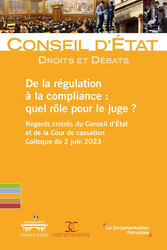
🌐follow Marie-Anne Frison-Roche on LinkedIn
🌐subscribe to the Newsletter MAFR Regulation, Compliance, Law
____
► Full Reference: M.-A. Frison-Roche, "Le rôle du juge dans le déploiement du droit de la régulation par le droit de la compliance" ("Synthesis: The role of the Judge in the deployment of Regulatory Law through Compliance Law"), Synthesis in Conseil d'État (French Council of State) and Cour de cassation (French Court of cassation), De la régulation à la compliance : quel rôle pour le juge ? Regards croisés du Conseil d'Etat et de la Cour de cassation - Colloque du 2 juin 2023, La Documentation française, "Droits et Débats" Serie, 2024, pp. 173-182
____
____
🚧read the bilingual Working Paper which is the basis of this article, with additional developments, technical references and hyperlinks
____
► Presentation of this concluding article: It is remarkable to note the unity of conception and practice between professionals who tend to work in administrative jurisdictions and professionals who tend to work in judicial jurisdictions: they all note, in similar terms, an essential movement: what Regulatory Law is, how it has been transformed into Compliance Law, and how in one and even more so in the other the Judge is at the centre of it.
Judges, as well as Regulators and European officials, explain this and use different examples to illustrate the far-reaching changes it brings to the Law and to the companies responsible for increasing the systemic effectiveness of the rules through the practice and dissemination of a Culture of Compliance.
The role of the judge participating in this Ex Ante transformation is renewed, whether he/she is a judge of Public Law or a judge of Private Law, in a greater unity of the legal system.
____
► English Summary of this article: The tug-of-war between 'Compliance' and 'conformity', which is exhausting us, obscures what is essential, i.e. the great novelty of a branch of law that assumes a humanist vision expressing the ambition to shape the future so that it is not catastrophic (preventing systems from collapsing), or even better (protecting human beings in these systems).
The article begins by describing the emergence of Compliance Law, as an extension of Regulatory Law and going beyond it. This new branch of law takes account of our new world, brings its benefits and seeks to counter these systemic dangers so that human beings could be their beneficiaries and are not crushed by them. This branch of Ex Ante Law is therefore political, often supported by public Authorities, such as Regulatory Authorities, but today it goes beyond sectors, as shown by its cutting edge, the Obligation of Vigilance.
The "Monumental Goals" in which Compliance Law is normatively anchored imply a teleological interpretation, leading to an "empowerment" of the crucial operators, not only States but also companies, responsible for the effectiveness of the many new Compliance Tools.
The article goes on to show that Judges are increasingly central to Compliance Law. Lawsuits are designed to make companies more accountable. In this transformation, the role of the judge is also to remain the guardian of the Rule of Law, both in the protection of the rights of the defence and in the protection of secrets. Efficiency is not what defines Compliance, which should not be reduced to a pure and simple method of efficiency, which would lead to being an instrument of dictatorship. This is why the principle of Proportionality is essential in the judge's review of the requirements arising from this so powerful branch of Law.
The courts are thus faced with a new type of dispute, of a systemic nature, in their own area, which must not be distorted: the Area of Justice.
____
📝read article (in French)
________
April 4, 2024
Thesaurus : Doctrine

► Référence complète : F. Ancel, "Quel rôle pour le juge aujourd’hui dans la compliance ? Quel office processuel du juge dans la compliance ?", in Conseil d'État et Cour de cassation, De la régulation à la compliance : quel rôle pour le juge ? Regards croisés du Conseil d'Etat et de la Cour de cassation - Colloque du 2 juin 2023, La Documentation française, coll. "Droits et Débats", 2024, pp. 101-119
____
► Résumé de l'article :
________

March 28, 2024
Publications

🌐suivre Marie-Anne Frison-Roche sur LinkedIn
🌐s'abonner à la Newsletter MAFR Regulation, Compliance, Law
____
 ► Référence complète : M.-A. Frison-Roche, L'émergence du Contentieux Systémique, document de travail, mars 2024.
► Référence complète : M.-A. Frison-Roche, L'émergence du Contentieux Systémique, document de travail, mars 2024.
____
🎤 Ce document de travail a été élaboré pour servir de base à la 1ière intervention, relative à "L'émergence du Contentieux Systémique", dans la conférence-débat sur Importance et spécificité du Contentieux Systémique Émergent , qui s'est tenue à la Cour d'appel de Paris le 29 mars 2024.
____
📝Il est aussi la base de l'article qui s'en suivra.
____
► Résumé du document de travail : Nous voyons émerger ce qu'il convient d'émerger un "Contentieux Systémique". Cette notion, proposée en 2021, vise l'hypothèse dans laquelle un système est "impliqué" dans une "cause" particulière soumise au juge. Il ne faut confondre présence d'un système et analyse systémique d'un phénomène. Le terme de "cause" doit être entendu au sens procédurale, tel que l'article 5 du Code civil l'utilise. Précisément, la prohibition portée par l'article 5 du Code civil ne s'applique pas parce qu'un système ainsi impliqué appelle des réponses et des solutions de fait et non pas nécessairement des solutions générales et abstraites : la solution de nature et de portée systémique que la présence d'un système dans une cause appelle peut être une solution de fait, même si elle irradie l'ensemble du système en cause. Mais précisément parce que la présence d'un système dans la cause entraîne souvent une question elle-même systémique, le juge s'il veut respecter l'article 4 du Code civil y répondre, non pas seulement a minima en n'éludant pas la question, par exemple celles des risques systémiques, mais encore pleinement en apporter des solutions systémiques, par exemple des remédiations pour préserver à l'avenir la solidité et la durabilité des systèmes impliqués dans le cas.
Ces systèmes peuvent être de différente nature : bancaire, financier, transport, sanitaire, énergétique, numérique, algorithmique ou climatique. Leur présence dans des cas portés à la connaissance des juges, dont la variété et les difficultés seront vus dans des contributions ultérieures, amènent à des questions de base relative à l'émergence du Contentieux Systémique : en premier lieu, comment peut-on définir le Contentieux Systémique ? En second lieu, qu'est-ce qu'il fait émerger cette catégorie de contentieux ? Des réponses apportées à ces deux questions découlent des conséquences pratiques essentielles.
Les solutions nouvelles doivent être conçues suivant que l'on admet que le système doit être considéré comme une "partie au litige", qui lui permettrait par une entité étant légitime à l'exprimer, d'alléguer des prétentions et de formuler des demandes contre un adversaire, ou comme une "partie à l'instance", catégorie beaucoup plus vaste, qui permettrait au juge d'entendre les intérêts des systèmes impliqués sans que des personnes ne puissent pour autant au nom d'un système formuler des prétentions à l'encontre ou au bénéfice d'une partie au litige.
____
🔓lire le document de travail ci-dessous⤵️
Feb. 15, 2024
Publications

🌐follow Marie-Anne Frison-Roche on LinkedIn
🌐subscribe to the Newsletter MAFR Regulation, Compliance, Law
____
► Full Reference: M.-A. Frison-Roche, "Adjusting General Procedural Law to Compliance Law by the Nature of things", in M.-A. Frison-Roche (ed.), Compliance Jurisdictionalisation, Journal of Regulation & Compliance (JoRC) and Bruylant, "Compliance & Regulation" Serie, 2024, pp. 273-28.
____
📝read the article
____
🚧read the bilingual Working Paper which is the basis of this article, with additional developments, technical references and hyperlinks
____
📘read a general presentation of the book, Compliance Jurisdictionalisation, in which this article is published
____
The principal elements of this articles had been presented during the scientific manifestation held on September 23, 2021, at Dauphine University in Paris, coorganised by the Journal of Regulation & Compliance (JoRC) and the Institute Droit Dauphine.
In the book this article is placed in the chapter II about the General Procedural Law in the Compliance Law.
____
► Summary of the article (done by the Journal of regulation & Compliance - JoRC): General Procedural Law is an invention, essentially due to Professor Motulsky, going well beyond the gain that one always has in comparing types of procedures with each other. As he asserted, there is Natural Law in General Procedural Law, in that as soon as there is the Rule of Law Principle there cannot be, whatever the "procedure", even the "process", such and such way of doing things: for example, to decide, to seize the one who decides, to listen before deciding, to contest the one who has decided.
General Procedural Law therefore depends on the nature of things. However, Compliance Law organizes things in a new way. Therefore, both the simple and iron principles of General Procedural Law creep in where we do not expect them at first sight, because there is no judge, this character around whom ordinary procedures fit together. The principles of General Procedural Law are essential in companies. Even if the regulations do not breathe a word about it, it is up to the Judges, in particular the Supreme Courts, to recognize this nature of things because on this effect of nature that General Procedural Law is built: when compliance mechanisms oblige companies to strike, General Procedural law must oblige, even in the silence of the texts, to arm those who can be hit, even stand up against devices that would set aside too much these defenses that are easily considered contrary to efficiency (I).
But because it is a question of making room for this nature of the things of which the Rule of Law Principle entrusts the custody to the Judge and the Lawyer, the General Procedural Law must also adjust itself to what the extraordinary new branch of Law Compliance Law is. Indeed, Compliance Law is extraordinary in that it expresses the political pretention to act now so that the future will not be catastrophic, by detecting and preventing the realization of systemic risks, or even that it is better, by building effective equality or real concern for others. Because it is the Monumental Goals that defines this new branch of Law, a disputed systemic issue, possibly disputed by several parties before a judge, the procedural principles used by the court must be broadened considerably: they must then include civil society and the future (II).
General Procedural Law thus naturally acquires an even more place than in the classic branches of Law since on the one hand it imposes itself outside of trials, particularly in companies and on the other before the courts it involves people who had hardly any place to speak and thinks themselves, especially the systems entering the "causes" of Compliance now debated before the Judge.
________
Dec. 27, 2023
Thesaurus : Doctrine

► Référence complète : Mélanges en l'honneur du Professeur Loïc Cadiet, LexisNexis, 2023, 600 p.
____
📗lire la 4ième de couverture de l'ouvrage
____
📗lire le sommaire de l'ouvrage
____
► Résumé de l'ouvrage (fait par l'éditeur) : "Maître incontesté du droit du procès, auteur d'innombrables livres et articles de référence sur la matière, le Professeur Loïc Cadiet est aussi l'homme du dépassement. Dépassement de sa terre d'origine, la Bretagne, même s'il ne s'en est jamais vraiment départi, pour conquérir Paris puis le monde. Dépassement de sa discipline d'origine, le droit de la responsabilité civile, auquel il a consacré sa thèse de doctorat et un livre majeur. Dépassement de sa discipline d'adoption, le droit judiciaire privé, en investissant sans cesse d'autres champs voisins, comme la sociologie, la philosophie, l'économie et bien sûr l'histoire. Dépassement de sa discipline encore, en la projetant, avant tout le monde, vers de nouveaux horizons, comme la contractualisation du procès, ou en la réorganisant autour de principes directeurs modernes et inédits . Dépassement de l'Université enfin, par les nombreuses missions qu'il a remplies hors les murs et notamment la dernière comme membre du Conseil supérieur de la magistrature.
Mais le Professeur Loïc Cadiet est aussi un universitaire dévoué, infatigable directeur de master, de mémoires et de thèses, ayant occupé de nombreuses responsabilités dans les universités où il a été en poste, jusqu'à la présidence du jury d'agrégation de droit privé et sciences criminelles en 2021, après avoir déjà siégé deux fois comme membre. Cette vie d'universitaire accomplie a été merveilleusement relatée dans la leçon magistrale de clôture qu'il a dispensée le 6 avril 2023 pour ce qui fut son dernier cours comme professeur titulaire et qui est publiée en ouverture de ces Mélanges.
Ceux-ci reflètent la vitalité intellectuelle de leur dédicataire. Avec 119 contributions, rédigées par des universitaires et par des praticiens, par des auteurs français et des auteurs étrangers qu'il a connus comme président de l'Association internationale de droit processuel, en droit judiciaire privé ou en d'autres disciplines, ces Mélanges feront évidemment date dans la littérature juridique, à l'image de celui à qui ils sont dédiés et qui occupe une place sans égale dans le monde académique et celui de la justice.
Nul doute que ce beau livre, magnifique témoignage de respect et d'amitié, obtiendra auprès des lecteurs le succès qu'il mérite et que justifie la personnalité, aussi discrète qu'exceptionnelle, de son récipiendaire.".
____
📝lire une présentation de l'article de Muriel Fabre-Magnan, "Critique de la convergence des responsabilités contractuelle et délictuelle. L'exemple du devoir de vigilance"
________
Nov. 30, 2023
Conferences
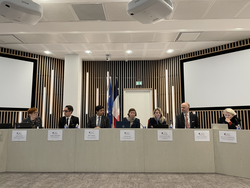
🌐follow Marie-Anne Frison-Roche on LinkedIn
🌐subscribe to the Newsletter MAFR Regulation, Compliance, Law
____
► Full Reference: M.-A. Frison-Roche, "Conclusion", in M. Boissavy, H. Dehghani-Azar, and M.-A. Frison-Roche (dir.), Journal of Regulation & Compliance (JoRC) and Conseil national des Barreaux (CNB), Compliance, vigilance et médiation (Compliance, Vigilance and Mediation), Amphitheatre of the Conseil national des Barreaux, November 30, 2023.
____
🧮see the full programme of this event
________
June 14, 2023
Conferences
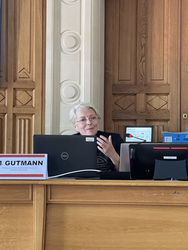
♾️follow Marie-Anne Frison-Roche on LinkedIn
♾️subscribe to the Newsletter MAFR Regulation, Compliance, Law
____
► Full Reference: M.-A. Frison-Roche, "Compliance et droit processuel" ("Compliance and Procedural Law"), in B. Deffains, M.-A. Frison-Roche and J.-B. Racine (dir.), Journal of Regulation & Compliance (JoRC) and University Panthéon-Assas (Paris II), Compliance : Obligation, devoir, pouvoir, culture (Compliance : obligation, duty, power, culture), University Panthéon-Assas, Salle des Conseils, 14 June 2023.
____
🧮See the full programme of this event
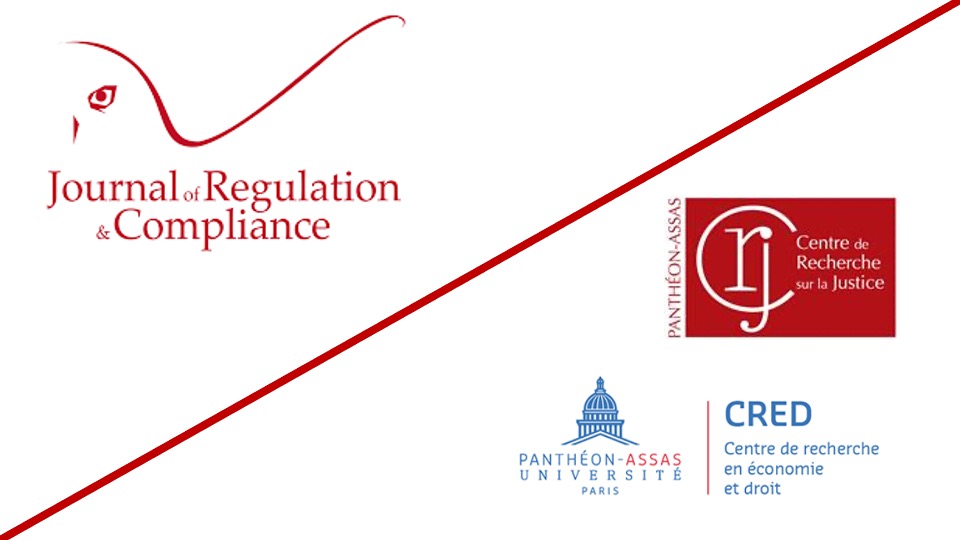
____
🎤see the other speech made during the first day of this symposium : "L'obligation de compliance, entre volonté et consentement : obligation sur obligation vaut" ("Compliance Obligation, between will and consent: obligation on obligation works")
____
► Summary of the conference: After referring to the chapter in the book Compliance Jurisdictionalisation, which deals more specifically with Procedural Law
The first development relates to the fact that the relationship between Compliance Law and Procedural Law is very difficult because it is often said that they simply have nothing to do with each other, or that they have everything to dislike each other. This is because Compliance is often reduced to processes, and to the mechanical place that algorithms could take in it, in taking care of everything.
Compliance would even have the purpose and effect of ensuring that the company and its managers never come into contact with a judge, the public prosecutor being their best ally in this respect.
Secondly, I recalled the very common idea that Procedural Law is a kind of 'tribute' that the rule of Law demands, which certainly weighs down companies when compared with companies living in systems in which there's not not such a price.
But many stress that Procedural Law could become a model. This can be justified and technically anticipated because it has already happened in Regulation Law, and Compliance Law is the deployment of it
In the third stage, I worked on the alliance between the two, with the procedure (rather than the process) modifying compliance and thereby reinforcing it, evoking the way in which this can manifest itself technically
In the fourth step, I looked for what would be the "naturally appropriate procedure" for Compliance: one that takes into account the duration and the development of "solutions", to which the notion of "sustainability", which is central in the substantive Law of Compliance, refers.
In a fifth stage, and devoting more time to this, I have pointed out where innovation should be the strongest: the proof, the probatory obligation being the "part totale" ("total part") of the compliance obligation. This major issue will be the subject of a series of symposiums held in 2024.
________
See the articles that are part of the Second chapter of the book 🕴️M.-A. Frison-Roche (ed.), 📘Compliance jurisdictionalisation, 2023 :
- 🕴️N. Cayrol, 📝General Procedural Law in Compliance Law,
- 🕴️F. Ancel, 📝The procedural principle of compliance, a new trial leading principle?,
- 🕴️B. Sillaman, 📝Privilege and Cooperation: Procedural Lessons Learned from the U.S. for Global Application,
- 🕴️A. Linden, 📝Motivation and publicity of the decisions of the restricted committee of the French Personal Data Protection Commission (Commission nationale de l'informatique et des libertés-CNIL) in a compliance perspective,
- 🕴️S. Scemla and 🕴️D. Paillot, 📝The supervisory Authorities face difficulties to apprehend the Rights of the Defense,
- 🕴️M.-A. Frison-Roche, 📝Adjusting by the nature of things General Procedural Law to Compliance Law.
🕴️M.-A. Frison-Roche, 🚧From Regulation Law to Compliance Law, 2017.
🕴️M.-A. Frison-Roche, 🎤Le rôle du Juge dans le déploiement du Droit de la Régulation en Droit de la Compliance (The role of the Judge in the deployment of Regulatory Law in Compliance Law), in 🧮De la Régulation à la Compliance : quel rôle pour le Juge ?, 2023.
Notably in this perspective, 🕴️M.-A. Frison-Roche and 🕴️M. Boissavy, 📕Compliance et droits de la défense. Enquête interne - CJIP - CRPC (Compliance and Due Process. Internal Investigation - DPA), 2024.
Feb. 2, 2023
Publications

♾️ follow Marie-Anne Frison-Roche sur LinkedIn
♾️ subscribe to the Newsletter MAFR Regulation, Compliance, Law
____
► Full Reference: M.-A. Frison-Roche, "Le jugeant-jugé. Articuler les mots et les choses face à l'éprouvant conflit d'intérêts" ("The Judge-Judged. Articulating words and things in the face of the testing conflict of interest"), in M.-A. Frison-Roche, (ed.), La juridictionnalisation de la Compliance, coll. "Régulations & Compliance", Journal of Regulation & Compliance (JoRC) and Dalloz, 2023, p. 59-80.
____
📝read the article (in French)
____
🚧read the bilingual Working Paper which is the basis of this article, with additional developments, technical references and hyperlinks
____
📕read a general presentation of the book, La juridictionnalisation de la Compliance, in which this article is published
____
► Summary of the article (done by the Journal of Regulation & Compliance): Since the topic of this article is part of a chapter devoted to the Company established as Prosecutor and Judge of itself by Compliance Law, chapter aiming to use the relevant qualifications, it is appropriate therefore to worry about the adjustment of words and things, of the way in which the relationship between ones and the others evolve, and of the more particular question of knowing if this evolution is radical or not when one speaks of "judge ".
because "judging" is a word that the Law has disputed with other disciplines, but that it has appropriated not so much to confer more powers on those who act in its name, for example that who supervise and punish, but on the contrary to impose limits, since to the one who judges it has put the chains of the procedure under foot, thus making bearable for the other the exercise of such a power. Therefore, those who want the power to judge would often want to not have the title, because having de jure the title of judge is being subject to the correlated regime, it is to be submitted to procedural correctness.
It is therefore to better limit that the Law sees who judges, for obliging this so-powerful character to the procedure. But the Law also has the power to appoint a judge and to fix the contours of all the characters in the trial. He usually does it with clarity, distinguishing the ones of the others, not confusing them. This art of distinction has constitutional value. Thus, not only the one who judges must be named "judge" but the procedural apparatus which goes with this character, and which constitutes a way of doing things and fundamental rights, are not "granted" by kindness or in a second step: it is a block. If you didn't want to have to endure procedural rights, you didn't have to want to be a judge. Admittedly, one could conclude that the procedure would therefore have become "substantial"; by this elevation, it is rather a fashion of saying that the procedure would no longer be a "servant": it is a kind of declaration of love for the procedure, as long as one affirms that at the acts of judging , or investigating, or prosecuting, are "naturally" attached the procedural rights for the one who is likely to be the object of these powers.
Compliance Law, in search of allies to achieve the Monumental Goals for the aims of which it was instituted, will require, or even demand, private companies to go and seek themselves, in particular through investigations. internal or active vigilance on others, for finding facts likely to be reproached to them. Compliance Law will also require that they prosecute those who have committed these acts. Compliance La will again demand that they sanction the acts that people have committed in their name.
This is clearly understood from the point of view of Ex Ante efficiency. The confusion of roles is often very efficient since it is synonymous with the accumulation of powers. For example, it is more efficient that the one who pursues is also the one who instructs and judges, since he knows the case so well... Besides, it is more efficient that he also elaborates the rules, so he knows better than anyone the "spirit" of the texts. This was often emphasized in Regulatory Law. When everything is Information and risk management, that would be necessary ... But all this is not obvious.
For two reasons, one external and the other internal.
Externally, the first reason is that it is not appropriate to "name" a judge who is not. This would be too easy, because it would then be enough to designate anyone, or even to do it oneself to appropriate the regime that goes with it, in particular for obtain a so-called legitimate power for obtaining that others obey even though they are not subordinate or from them they transmit information, even though they would be competitors: it would then be necessary to remember that only the Law is able to appoint judge ; in this new Compliance era, companies would be judges, prosecutors, investigators! Maybe, if the Law says it, but if it didn't, it would be necessary to come back to this tautology ... But are we in such a radicalism? Moreover, do judges have "the prerogative" of judgment and the Law has not admitted this power for companies to judge for a long time? As soon as the procedure is there in Ex Ante and the control of the judge in Ex Post?
The second reason, internal to the company, situation on which the article focuses, is that the company investigates itself, judges itself, sanctions itself. However, the legal person expressing its will only through its organs, we underline in practice the difficulties for the same human being to formulate grievances, as he/she is the agent of the legal person, addressed to the natural person that he/she himself/herself is. The two interests of the two are not the same, are often opposed; how the secrets of one can be kept with respect to the other, represented by the same individual? ... It is all the mystery, even the artifice of legal personality that appears and we understand better that Compliance Law no longer wants to use this strange classical notion. Because all the rules of procedure cannot mask that to prosecute oneself does not make more sense than to contract with oneself. This conflict of interest is impossible to resolve because naming the same individual X then naming him/her Y, by declaring open the dispute between them does not make sense.
This dualism, which is impossible to admit when it comes to playing these functions with regard to corporate officers, can come back to life by setting up third parties who will carry secrets and oppositions. For example, by the designation of two separate lawyers for the human being agent and the human being representative of the legal person, each lawyer being able to have secrets for each other and to oppose each other. These spaces of reconstitution of the so "natural" oppositions in procedure between the one who judges and the one who is judged can also take the technological form of platforms: where there is no longer anyone, where the process has replaced the procedure, there is no longer any human judgment. We can thus see that the fear of conflicts of interest is so strong that we resign ourselves to saying that only the machine would be "impartial", a derisory conception of impartiality, against which it is advisable to fight.
This then leads to a final question: can the company claim to exercise the jurisdictional power to prosecute and judge and investigate without even claiming to be a prosecutor, an investigating judge, or a court? The company's advantage would be to be able to escape the legal regime that classical Law attaches to its words, mainly the rights of the defense and the rights of action for others, the principle of publicity of justice for everyone, which expresses the link between procedure and democracy. When Facebook said on June 12, 2021 "react" to the decision of May 5, 2021, adopted by what would only be an Oversight Board to decide "as a consequence" of a 2-year suspension of Donald Trump's account, the art of qualifications seem to be used in order to avoid any regime constraint.
But this art of euphemism is very old. Thus, the States, when they wanted to increase repression, presented the transformation of the system as a softening of it through the "decriminalization" of Economic Law, transferred from the criminal courts to the independent administrative agencies. The efficiency was greatly increased, since the guarantees of the Criminal Procedure ceased to apply. But 20 years later, Words found their way back to Things: under Criminal Law, slept the "criminal matter", which requires the same "Impartiality". In 1996, a judge once affirmed it and everything was changed. Let us therefore wait for what the Courts will say, since they are the masters of qualifications, as Article 12 of the French Code of Civil Procedure says, as Motulsky wrote it in 1972. Law has time.
________
Feb. 2, 2023
Thesaurus : Doctrine

► Full Reference: F. Ancel, "Le principe processuel de compliance, un nouveau principe directeur du procès ?" (The procedural principle of compliance, a new trial leading principle?), in M.-A. Frison-Roche (ed.), La juridictionnalisation de la Compliance, coll. "Régulations & Compliance", Journal of Regulation & Compliance (JoRC) and Dalloz, 2023, p. 225-230.
____
📕read a general presentation of the book, La juridictionnalisation de la compliance, in which this article is published
____
► Summary of the article (done by the Journal of Regulation & Compliance): Through this article, the author formulates a proposal: elevating the principle of compliance to the rank of leading principle of the trial. To support this, the author firstly emphasizes the convergence of the aims of compliance and the purpose of the trial. Indeed, emphasizing that Compliance Law does not oust either the State or the judge, as soon as compliance means that the person must keep their commitments and that the trial is also based on this principle that the parties must conform to the principles and to their own "speech", compliance thus becomes a trial leading principle.
In a second part of the article, the author illustrates his point in a very concrete way. First, the protocols of procedure which are drawn up by the courts and the bars are commitments which should justify a form of constraint which, if it should not have the same form and nature as that of the law, must all the same even have consequences when a party fails to do so. Secondly, relying on French case law which sanctions a party which had accepted the principle of an arbitration and then systematically hinders its implementation, the author suggests that under the principle of compliance can be grouped the notions for the instant scattered of loyalty, consistency (estoppel) and efficiency.
Thus, this "open practice" echoing the "open way" of a procedural principle of compliance brings out this one.
________
Feb. 2, 2023
Publications

♾️ follow Marie-Anne Frison-Roche on LinkedIn
♾️ subscribe to the Newsletter MAFR Regulation, Compliance, Law
____
► Full Reference: M.-A. Frison-Roche, "Conforter le rôle du Juge et de l'Avocat pour imposer la Compliance comme caractéristique de l'État de Droit" ("Reinforce the Judge and the Attorney to impose Compliance Law as a characteristic of the Rule of Law"), in M.-A. Frison-Roche (dir.), La juridictionnalisation de la Compliance, coll. "Régulations & Compliance", Journal of Regulation & Compliance (JoRC) and Dalloz, 2023, p. 29-55.
____
► This article is the introduction of the book.
____
📝read the article (in French)
____
🚧read the bilingual Working Paper which is the basis of this article, with additional developments, technical references and hyperlinks
____
📕read a general presentation of the book, La juridictionnalisation de la Compliance, in which this article is published
____
► Summary of the article (done by the Journal of Regulation & Compliance): One can understand that the compliance mechanisms are presented with hostility because they seem designed to keep the judge away, whereas there is no Rule of Law without a judge. Solid arguments present compliance techniques as converging towards the uselessness of the judge (I). Certainly, we come across magistrates, and of all kinds, and powerful ones, but that would be a sign of imperfection: its ex-ante logic has been deployed in all its effectiveness, the judge would no longer be required... And the lawyer would disappear so with him...
This perspective of a world without a judge, without a lawyer and ultimately without Law, where algorithms could organize through multiple processes in Ex Ante the obedience of everyone, the "conformity" of all our behaviors with all the regulatory mass that is applicable to us, supposes that this new branch of Law would be defined as the concentration of processes which gives full effectiveness to all the rules, regardless of their content. But supposing that this engineer's dream is even achievable, it is not possible in a democratic and free world to do without judges and lawyers.
Therefore, it is imperative to recognize their contributions to Compliance Law, related and invaluable contributions (II).
First of all, because a pure Ex Ante never existed and even in the time of the Chinese legists, people were still needed to interpret the regulations because a legal order must always be interpreted Ex Post by who must in any case answer the questions posed by the subjects of law, as soon as the political system admits to attributing to them the right to make claims before the Judge. Secondly the Attorney, whose office, although articulated with the Judge's office, is distinct from the latter, both more restricted and broader since he must appear in all cases where the judicial figure puts himself in square, outside the courts. However, Compliance Law has multiplied this since not only, extending Regulatory Law, it entrusts numerous powers to the administrative authorities, but it also transforms companies into judges, in respect of which the attorneys must deal with.
Even more so, Compliance Law only takes its sense from its Monumental Goals. It is in this that this branch of the Law preserves the freedom of human beings, in the digital space where the techniques of compliance protect them from the power of companies by the way that the Compliance Law forces these companies to use their power to protect people. However, firstly, it is the Judges who, in their diversity, impose as a reference the protection of human beings, either as a limit to the power of compliance tools or as their very purpose. Secondly, the Attorney, again distinguishing himself from the Judge, if necessary, reminds us that all the parties whose interests are involved must be taken into consideration. In an ever more flexible, soft, and dialogical Law, everyone presenting himself as the "advocate" of such and such a monumental goal: the Attorney is legitimate to be the first to occupy this place.
________